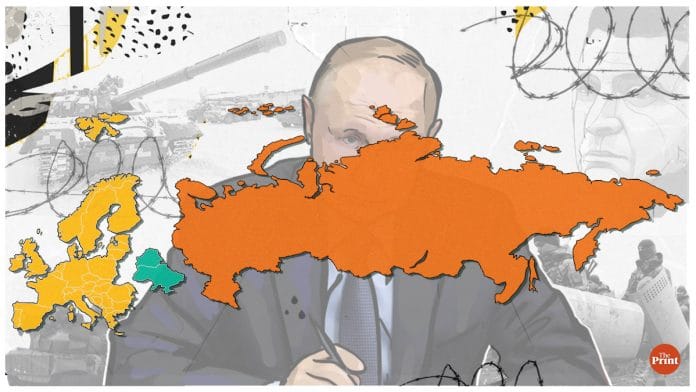One can consider the Ukraine conflict at three levels. At the obvious one, Vladimir Putin is the bad guy who has attacked an independent country after surreally declaring it a non-country. He has also misread the Ukrainians, who wish to be part of the West, and bungled militarily. This means he may now have to dangerously up the ante and/or face trouble at home. Either way, his country and its economy — rendered an outcaste by the Western powers — face a diminished future. No sensible leader would have put his people in such a pickle.
There is a second, geo-political level at which to view these events. When the Soviet Union collapsed three decades ago, commentators like Henry Kissinger and Zbigniew Brzezinski observed that the collapse of the Soviet Union did not mean an end to the strategic threat from Russia. In effect, they were harking back to the theory put forward by Halford Mackinder, a British imperialist geographer who argued in 1904 that the globe was divided into two parts: a Eurasian “heartland” comprising eastern Europe and inland Asia, and “subordinate” maritime lands like the United States that depended on sea power. What is relevant in today’s context is that he argued for creating a strip of independent states that would separate Germany and Russia — in effect, a buffer zone.
What the Western powers have done in the past three decades is to ignore that advice and expand both the European Union and the North Atlantic Treaty Organization eastward, intending to take both to the Russian doorstep. In effect, they wanted to make sure the Eurasian “heartland” power that is Russia would not be able to challenge them, as the old Soviet state had done. Putin warned against cornering his country, specifically mentioned the Eurasian concept in a landmark speech, and wanted a Russian zone of influence to its west. Kissinger himself argued (to no avail) in the last few months for keeping neutral buffer states between Russia and the West. As things may turn out, a settlement to end the conflict could well mean treating Ukraine (and Belarus) as a buffer zone — which is more or less what Russia had wanted all along. What remains unknown is whether the sanctions against Russia will last beyond any such settlement. If they do, it would mean that the geo-political intent to corner Russia remains.
Also Read: As globalisation is bombed, a ‘fortress economy’ is tempting, but India must know its limits
There is, finally, the third level of civilisational ideas through which to view the longer-term development of the European New Right and its variants. Parties devoted to challenging the dominant liberal democratic idea have captured power in countries like Hungary, and gained traction elsewhere through political parties inclined to an ethno-national view in Germany, France, and Sweden. The ideological under-pinning for this challenge comes from a quite different intellectual tradition, with the alternative construct variously articulated by Russian, German, and French philosophers, historians, and journalists of a century ago, some of whom had identified with the Nazis and European fascism.
These writers question the concepts of liberalism, egalitarianism, and the “Rights of Man” that focus on individual freedoms, and instead argue in favour of a communitarian view of society, the use of violence, the pursuit of national greatness or destiny, and the cult of the Leader. They talk of the “insurrection of national populisms”, reject universal values as the “destruction of difference”, and subscribe to an ethno-nationalism that endorses social hierarchies and excludes minorities from a concept of ethno-nationhood that is free from the factual world — all of it in pursuit of a rooted future.
The Indian echo of all this is self-evident, in the spread of ideas and attitudes that (through fact-free assertions) challenge the existing Constitutional scheme of a liberal democracy with primacy for individual rights. But Putin himself may be merely instrumentalist in his quoting of such writers and his use of their ideas to pursue his goal of making Russia an autonomous centre of world development. Still, his speeches have referred to the Eurasian and other concepts and justify a rendering of Russian history vis-à-vis Ukraine that goes beyond “mere facts”. His ambitions may come unstuck because of over-reach, but the Mackinder worldview and the larger ideological challenge remain.
By special arrangement with Business Standard
Also Read: Modi or Boris Johnson, it’s all about zeitgeist. Now go Google it






